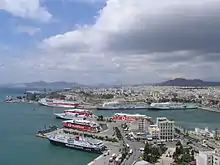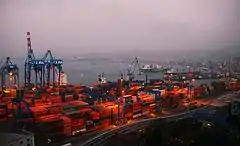Harbor
A harbor (American English), harbour (British English; see spelling differences), or haven is a sheltered body of water where ships, boats, and barges can be docked. The term harbor is often used interchangeably with port, which is a man-made facility built for loading and unloading vessels and dropping off and picking up passengers. Ports usually include one or more harbors. Alexandria Port in Egypt is an example of a port with two harbors.


Harbors may be natural or artificial. An artificial harbor can have deliberately constructed breakwaters, sea walls, or jettys or they can be constructed by dredging, which requires maintenance by further periodic dredging. An example of an artificial harbor is Long Beach Harbor, California, United States, which was an array of salt marshes and tidal flats too shallow for modern merchant ships before it was first dredged in the early 20th century.[1] In contrast, a natural harbor is surrounded on several sides of land. Examples of natural harbors include Sydney Harbour, New South Wales, Australia and Trincomalee Harbour in Sri Lanka.
History
As a rule, the harbor is called the water area of the port, directly adjacent to the berth am, where the loading and unloading of ships, embarkation and disembarkation of passengers are carried out. Also in the harbor, ships can be at a long anchorage at the pier or at anchor. For this purpose, special places for anchorage will be equipped on the territory of the harbor.[2]
The harbor can be artificial or natural. For a natural harbor, choose a place well protected from waves and wind, surrounded on several sides by land areas.[3]
An artificial harbor usually has purpose-built breakwaters, and dredging is also used in the construction of artificial harbors. Natural harbors require maintenance through periodic depth measurements and, if necessary, further periodic dredging.[4] An example of an artificial harbor is Long Beach Harbor, California, USA, which was an array of salt marshes and tidal banks too shallow for modern merchant ships. At the beginning of the 20th century, dredging works were carried out here.[5]
Artificial harbors
Artificial harbors are frequently built for use as ports. The oldest artificial harbor known is the Ancient Egyptian site at Wadi al-Jarf, on the Red Sea coast, which is at least 4500 years old (ca. 2600-2550 BCE, reign of King Khufu). The largest artificially created harbor is Jebel Ali in Dubai.[6] Other large and busy artificial harbors include:
- Port of Houston, Texas, United States;
- Port of Long Beach, California, United States;
- Port of Los Angeles in San Pedro, California, United States.
- Port of Rotterdam, Netherlands;
- Port of Savannah, Georgia, United States;
The Ancient Carthaginians constructed fortified, artificial harbors called cothons.
Natural harbors
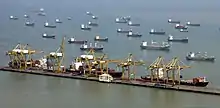
A natural harbor is a landform where a section of a body of water is protected and deep enough to allow anchorage. Many such harbors are rias. Natural harbors have long been of great strategic naval and economic importance, and many great cities of the world are located on them. Having a protected harbor reduces or eliminates the need for breakwaters as it will result in calmer waves inside the harbor. Some examples are:
- Bali Strait, Indonesia
- Berehaven Harbour, Ireland
- Balikpapan Bay in East Kalimantan, Indonesia
- Mumbai in Maharashtra, India
- Boston Harbor in Massachusetts, United States
- Burrard Inlet in Vancouver, British Columbia, Canada
- Cork Harbour, Ireland
- Grand Harbour, Malta
- Guantánamo Bay, Cuba
- Gulf of Paria, Trinidad and Tobago
- Halifax Harbour in Nova Scotia, Canada
- Hamilton Harbour in Ontario, Canada
- Killybegs in County Donegal, Ireland
- Kingston Harbour, Jamaica
- Marsamxett Harbour, Malta
- Milford Haven in Wales, United Kingdom
- New York Harbor in the United States
- Pago Pago Harbor in American Samoa
- Pearl Harbor in Hawaii, United States
- Poole Harbour in England, United Kingdom
- Port Hercules, Principality of Monaco
- Sydney Harbour in Australia, technically a ria
- Tanjung Perak in Surabaya, Indonesia
- Port of Tobruk in Tobruk, Libya
- Presque Isle Bay in Pennsylvania, United States
- Prince William Sound in Alaska, United States
- Puget Sound in Washington state, United States
- Roadstead of Brest in Brittany, France
- San Francisco Bay in California, United States
- Scapa Flow in Scotland, United Kingdom
- Sept-Îles in Côte-Nord, in Quebec, Canada
- Shelburne in Nova Scotia, Canada
- Subic Bay in Zambales, Philippines
- Tampa Bay in Florida, United States
- Trincomalee Harbour, Sri Lanka
- Tuticorin in Tamil Nadu, India
- Victoria Harbour in Hong Kong
- Visakhapatnam Harbour, India
- Vizhinjam in Trivandrum, India
- Waitemata Harbour in Auckland, New Zealand
- Zihuatanejo Harbor, Mexico
Ice-free harbors
For harbors near the North and South poles, being ice-free is an important advantage, especially when it is year-round. Examples of these are:
- Hammerfest, Norway
- Liinakhamari, Russia
- Murmansk, Russia
- Nakhodka in Nakhodka Bay, Russia
- Newcastle upon Tyne, United Kingdom
- Pechenga, Russia
- Prince Rupert, Canada
- Valdez, United States
- Vardø, Norway
- Vostochny Port, Russia
The world's southernmost harbor, located at Antarctica's Winter Quarters Bay (77° 50′ South), is sometimes ice-free, depending on the summertime pack ice conditions.[7]
Important harbors
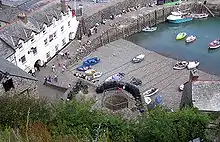
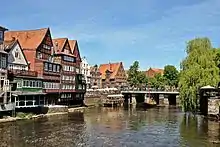




Although the world's busiest port is a contested title, in 2017 the world's busiest harbor by cargo tonnage was the Port of Ningbo-Zhoushan.[11]
The following are large natural harbors:
- Algeciras, Spain
- Amsterdam, Port of Amsterdam, Netherlands
- Antwerp, Port of Antwerp, Flanders, Belgium
- Baltimore's Inner Harbor, Maryland, United States
- Botwood, Newfoundland, Canada
- Bremerhaven, Germany
- Buenos Aires, Argentina
- Busan, South Korea
- Calabar, Nigeria
- Cartagena, Colombia
- Charleston, South Carolina, United States
- Chennai, Tamil Nadu, India
- Port of Chittagong, Chittagong City, Bangladesh
- Dnipro, Ukraine
- Durban, South Africa
- Falmouth, Cornwall, England, United Kingdom
- Freetown Harbour, Sierra Leone
- Golden Horn, Istanbul, Turkey
- Gothenburg, Sweden
- Gwangyang, South Korea
- Hai Phong Port, Haiphong, Vietnam
- Haifa, Israel
- Hakodate, Japan
- Halifax Harbour, Nova Scotia, Canada
- Hamburg Harbour, Germany
- Hampton Roads, Norfolk, Virginia, United States
- Havana Harbor
- Helsinki, Finland
- Incheon, South Korea
- Izmir, Turkey
- Port of Jakarta (Tanjung Priok), Jakarta, Indonesia
- Kaliningrad, Russia
- Karachi, Sindh, Pakistan
- Kerch and Port Krym to Port Kavkaz, Russia
- Kyiv, Ukraine
- Kingston, Jamaica
- Kobe Harbour, Kobe, Japan
- Port of Kolkata, Kolkata, West Bengal, India
- Port of Lisbon, Lisbon, Portugal
- Lushunkou, Dalian, China
- Mahón, Menorca, Spain
- Manila Bay, Philippines
- Maputo, Mozambique
- Milford Haven, Wales, United Kingdom
- Milwaukee, Wisconsin
- Montevideo, Uruguay
- Mumbai, India
- Nassau, Bahamas
- New York Harbor, United States
- Mykolaiv, Ukraine
- Novorossiysk and Anapa, Russia
- Odessa, Ukraine
- Osaka, Japan
- Oslofjord and Oslo, Norway
- Pärnu, Estonia
- Plymouth Sound, Devon, England, United Kingdom
- Port of Portland, Casco Bay, Maine, United States
- Port of Sevastopol, Sevastopol, Crimea
- Port Phillip, Melbourne, Victoria, Australia
- Provincetown Harbor, Provincetown, Massachusetts, United States
- Rio de Janeiro, Guanabara Bay, Brazil
- Rostov-on-Don, Russia
- Rotterdam, Port of Rotterdam, Netherlands
- Salvador, All Saint's Bay, Brazil
- San Antonio, Chile
- San Diego Bay, San Diego, California, United States
- Saint Petersburg, Russia
- Sochi and Adlersky City District, Russia
- Stockholm, Sweden
- Tallinn, Estonia
- Tanger-Med, Tangier, Morocco
- Tanjung Perak, Surabaya, Indonesia
- Tauranga Harbour, Tauranga, New Zealand
- Tokyo Bay, Tokyo, Japan
- Trincomalee, Sri Lanka
- Tuticorin, Tamil Nadu, India
- Port of Tyne, Tyne & Wear, United Kingdom
- Ulsan, South Korea
- Victoria & Esquimalt Harbours, Victoria, British Columbia, Canada
- Victoria Harbour (Hong Kong)
- Vizhinjam in Trivandrum, India
- Vladivostok, Russia
- Vyborg, Russia
- Willemstad, Curaçao
- Wellington Harbour, New Zealand
- Yevpatoria, Russia
- Zaporozhe, Ukraine

See also
- Boyd's Automatic tide signalling apparatus
- Dock
- Ice pier
- Inland harbor
- List of marinas
- List of seaports
- Mandracchio
- Marina
- Mulberry harbour
- Quay
- Roadstead
- Seaport
- Shipyard
- Wharf
Notes
- "Geology 303 Ch 8 Los Angeles and Long Beach Harbors". Archived from the original on 2014-02-23. Retrieved 2014-01-21.
- Directory 1987.
- Stanyukovich KM Dictionary of marine terms found in stories.
- Handbook 1987.
- "Geology campus". Archived from the original on 2014-02-23. Retrieved 2014-01-21.
- Hattendorf, John B. (2007), The Oxford encyclopedia of maritime history, Oxford University Press, p. 590, ISBN 978-0-19-513075-1
- U.S. Polar Programs National Science Foundation FY2000.
- "Circuit Guide | Punta del Este, Uruguay". FIA Formula E. Archived from the original on 2014-12-09. Retrieved 2014-08-24.
- "Formula E reveals circuit for Punta del Este ePrix". FIA Formula E. 2014-06-20. Archived from the original on 2018-06-12. Retrieved 2014-08-24.
- "Formula E unveils Punta del Este circuit in Uruguay". autosport.com. 2014-06-20. Retrieved 2014-08-24.
- "Global Port Development Annual Report (2017)". Archived from the original on 2021-01-08. Retrieved 2021-10-29.
External links
- Harbor Maintenance Finance and Funding Congressional Research Service
- . New International Encyclopedia. 1905.

